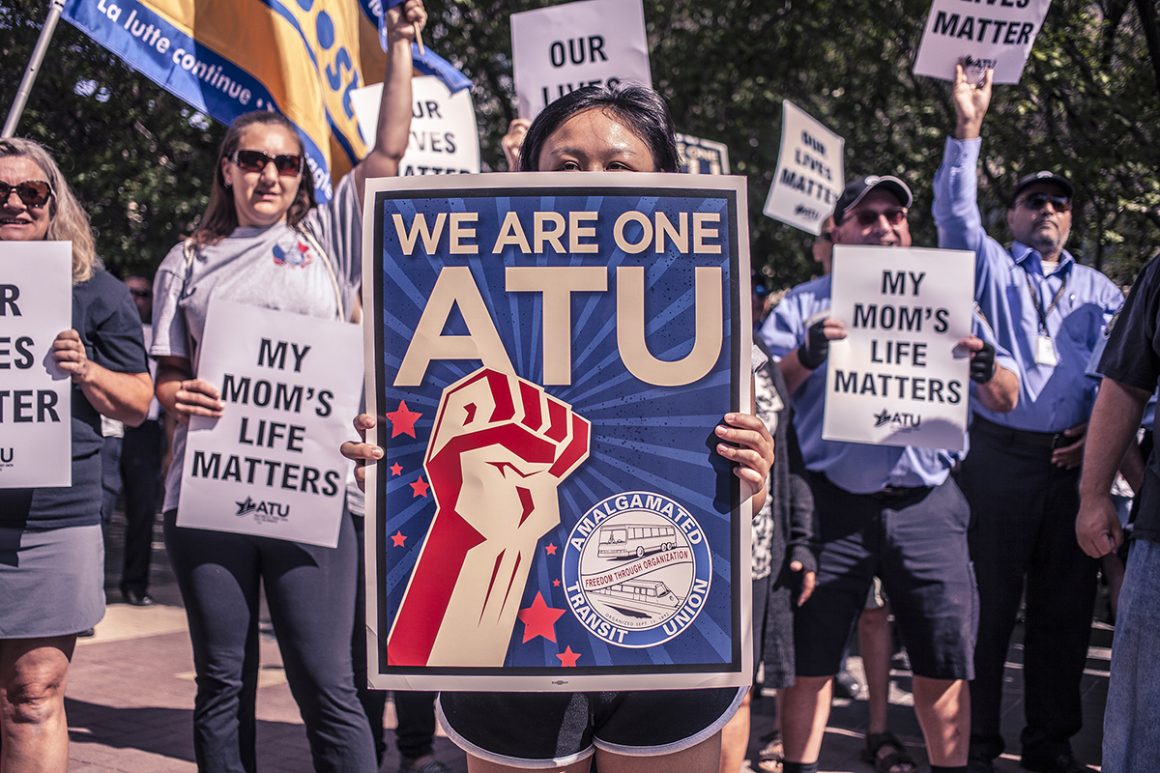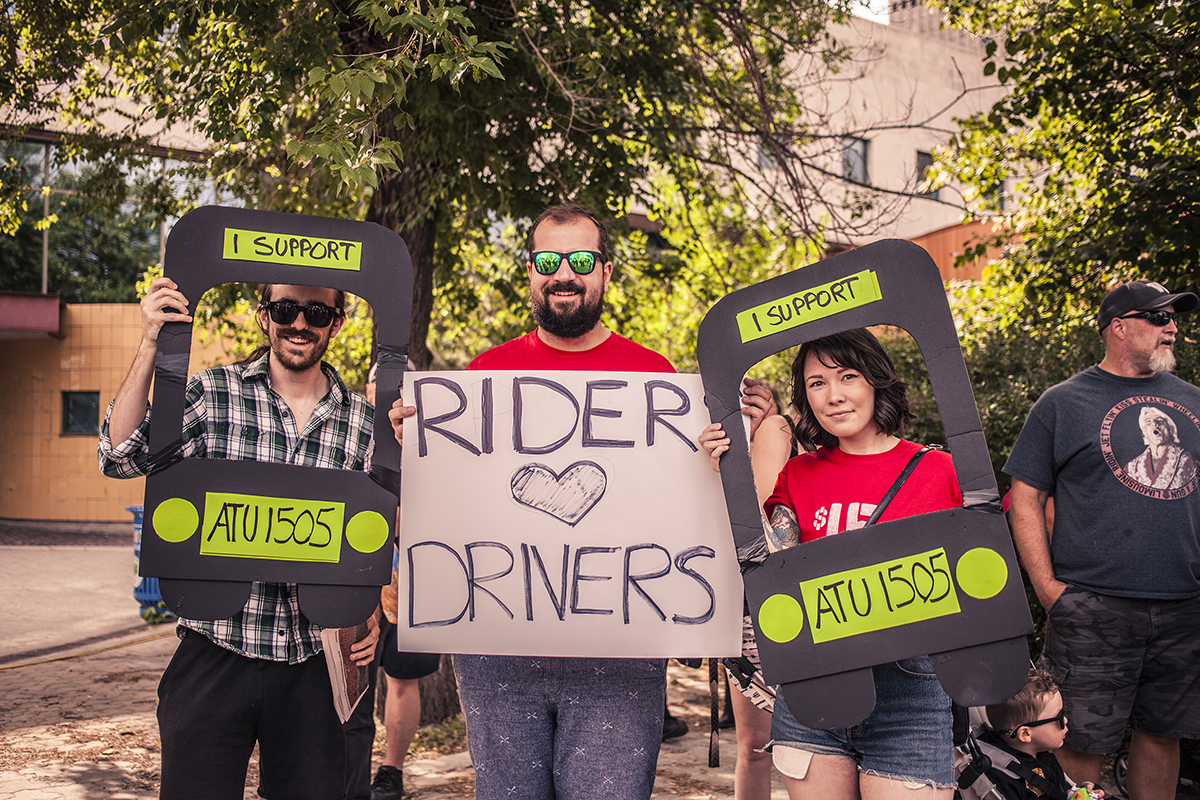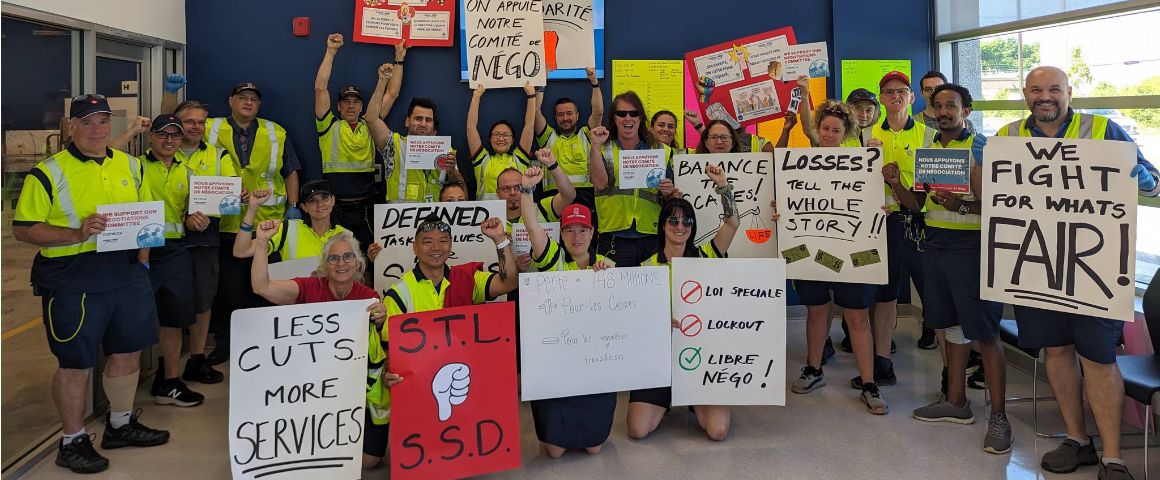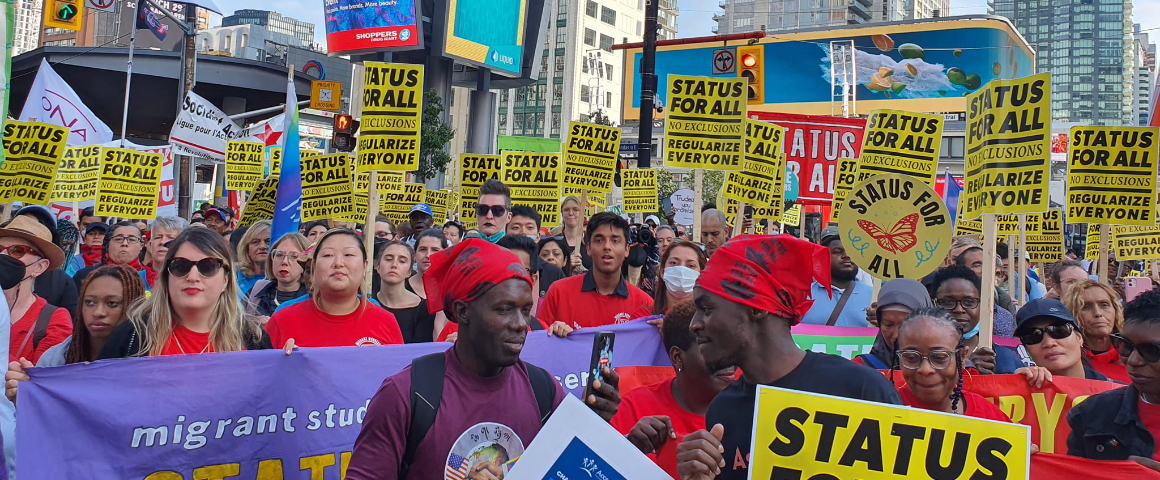WINNIPEG, Manitoba — Hundreds of members of Amalgamated Transit Union Local 1505, who are in negotiations with Winnipeg Transit, gathered in front of the Winnipeg General Strike centenary monument to deliver a message to Winnipeg City Hall and Mayor Brian Bowman. They were joined by many supporters, including members of the Manitoba Teachers Society and Fight for $15 and Fairness. Turnout was especially noteworthy considering the total membership of the union is around 1,400.
Transit operators have been without a contract since their agreement expired on January 12. On July 22 the City backed out of negotiations, alleging that the union was not making any proposals on general wage increases. In contrast, ATU said that the City was unwilling to discuss key issues around working conditions and scheduling. The latter is a particular concern to an overworked and stressed workforce that is providing a vital public service in Winnipeg.
As a gesture of good faith, the ATU lifted a voluntary overtime ban on July 26. A week later, the City tabled its final offer, which focused solely on wages and appeared to be more of a stunt than a sincere offer.
The City has preferred to fight on another territory than the bargaining table, though: fear-mongering about a possible strike has been a constant in Winnipeg corporate media, where the City’s line is dutifully echoed by stenographers like the Free Press’ Tom Brodbeck.
But ATU 1505 President Chowdry was clear in his remarks, that the important issue for his membership was to increase control over their working lives. “The number one thing we’ve said since day one is that it’s the working conditions. The number one issue is the working conditions and if they’re not addressed, then we’re not signing a contract. It’s not all about the money.”
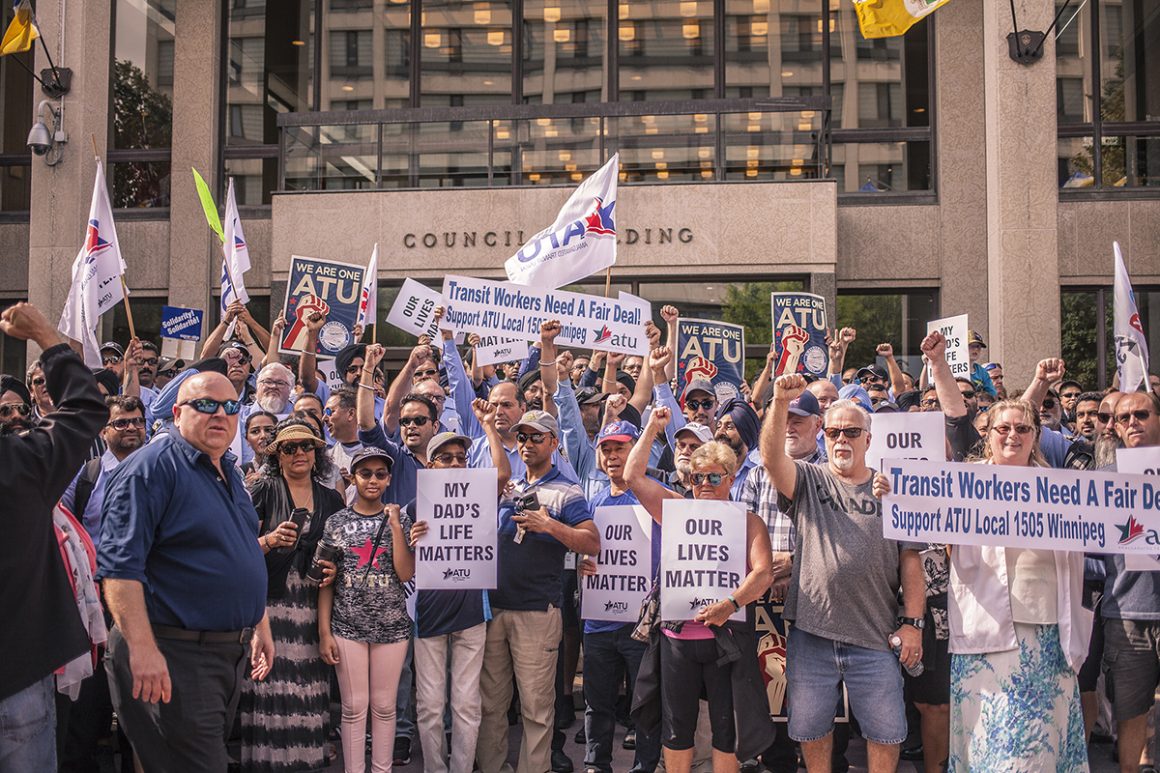
Another ATU representative spoke of workers paying the price for City mismanagement. “I want to make it very clear that we are here for our riders and for the public. It is important to have a good public system in place. We’re the ones that keep the city moving.” But poor scheduling and high prices mean increased disputes with customers, which can quickly escalate and lead to assaults on operators. At any given time 40% of buses are running late, a direct result of the lack of transit funding from the City. Winnipeg ended 2018 with an astonishing budget surplus of $14.2 million, but seems unwilling to discuss a much-needed expansion of service.
The ATU representative pointed out that 26 years ago, the City had a fleet of 560 buses. Now the City has a fleet of 570 buses, but even that does not represent an increase in capacity as the newer, more accessible, low-floor buses have ten fewer passengers than the older vehicles.
Throughout the rally ATU speakers emphasized the union’s overall concern for public transit and ridership. “Public transportation is more than just people riding buses,” said one speaker. “It’s an opportunity to empower people, to get people to their doctor’s appointments, to get them to work, to get them to school. It empowers seniors [who] aren’t left at home, unable to get around. That’s what this is all about – providing a good public service to the citizens of Winnipeg and we are the custodians of that service. That’s why we’re standing on this!”
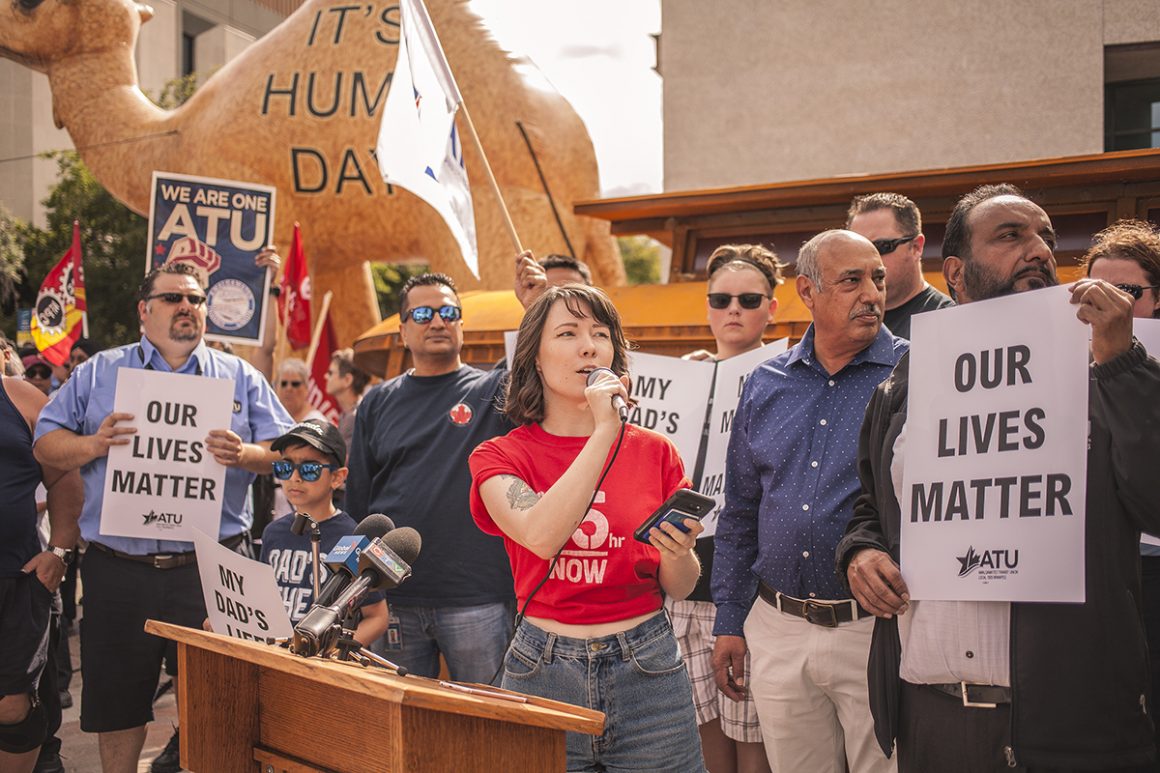
Emily Leedham, an organizer with Fight for $15 and Fairness Manitoba, also spoke of the difficulties relating to scheduling and fares. “Many low-wage workers, including myself, rely on the bus as a primary mode of transportation. The transit service as it currently operates does not serve our needs. Transit is consistently late which makes it difficult to plan our lives, get to work or school, visit friends, access social services, small businesses and community services. Not to mention it’s a $6 round-trip fare, which adds up when you’re only making $11.35 an hour.”
Speaking about the poor working conditions, Leedham said she recognized that transit workers were on the front-line dealing with fare disputes, and she offered support for the union’s fare free job actions. Fight for $15 and Fairness advocates free transit as a long-term goal, but also as the best way to eliminate conflicts and improve safety for drivers and riders.
Since ATU’s job action electrical workers at the Toronto Transit Commission, represented by CUPE Local 2, have put out a public and highly publicized call for free public transit as a matter of economic and social justice in the context of a transit crisis.
Concerns about a possible transit lockout or strike are taking place in advance of the September 10 provincial election. The incumbent Conservative Party government, led by Brian Pallister, is advancing a corporate agenda that has seen many public services cut and social problems exacerbated by the privatization of social housing. In its first three years, the Pallister government cut funding to public transit and nixed a 50/50 public transit funding agreement with municipalities. It is within that broader context of an assault on public services and social institutions that the progressive demand for free public transit is being raised.
As of press-time, the Communist Party is the only one of six parties running that has made free public transit part of its platform. A spokesperson for the Communist Party said, “Our proposal is that the province establish a public corporation under democratic control, to build and operate accessible, free and frequent public transit, not just in the City of Winnipeg but across Manitoba and between rural and urban communities. The demise of private operators like Greyhound who no longer saw a profit in exploiting rural Manitobans has been a shock to many as well as an incredible safety risk. We think mobility is a public good. This province needs a vision for the 21st century of green and free transit that connects Manitobans within and outside their communities.”
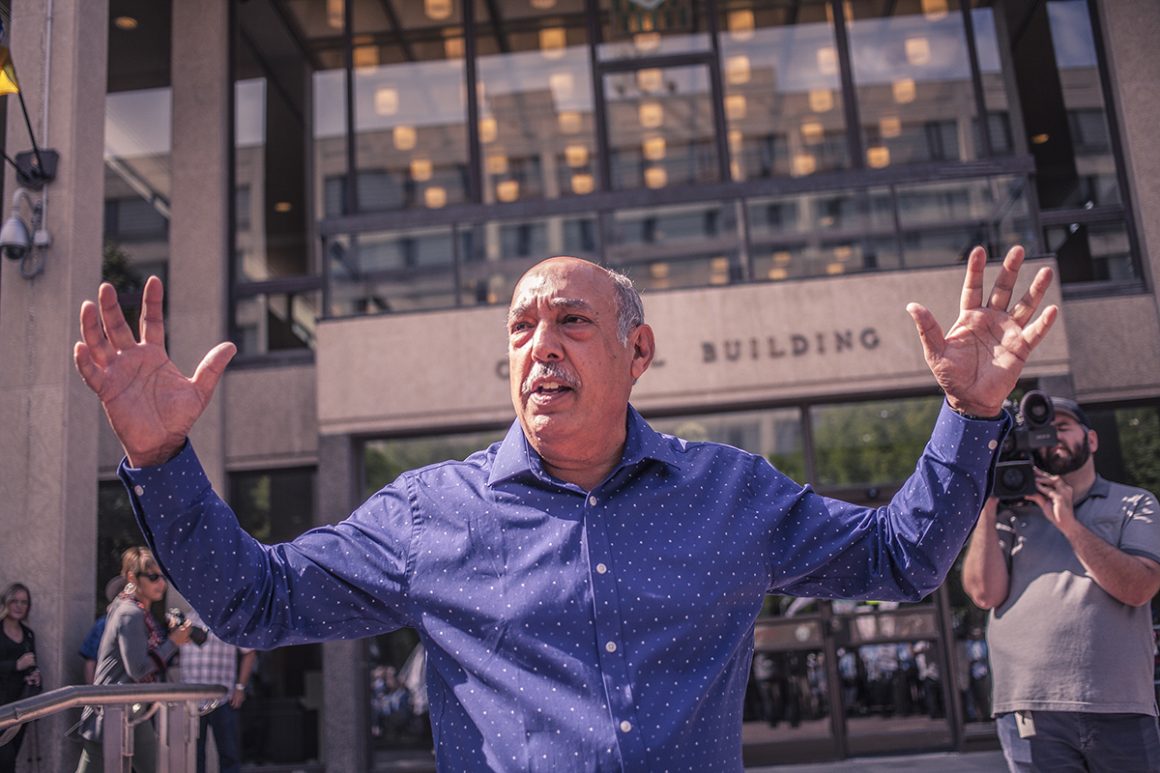
Despite the City’s intransigence at the bargaining table, the ATU remains strong and united with a savvy leadership. The demands for expanded service are truly responsive to the needs of residents of Winnipeg, a city dominated by a ruling class which prefers an antiquated car culture and the disastrous form of urban development that goes along with it. If the ATU is able to relate their demands to a long-term struggle for free, public transit and win it, it could be a key reform to improve the lives of Manitoba working people. It could inspire movements and unions across North America to take up this demand.
